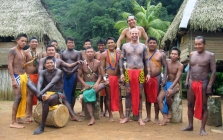“I told the Peace Corps to put me in the most difficult position they could, and they did,” said Masters of Arts in TESOL candidate, Christopher Upchurch, on his service with Peace Corps and the challenges he faced while abroad and at home.
Originally from Indianapolis, Upchurch studied Spanish and Christian ministries before serving with the Peace Corps in Panama. While there, Upchurch traded in his conservative garb (read: Columbia insulated jackets and jeans) in exchange for crimson and golden loincloths, assisting indigenous community leaders in bettering their ecotourism business. Stationed in Chagres National Park, located just north of Panama City, Upchurch worked on lesson and action plans to help groups of indigenous peoples improve their financial outlook.
While there, Upchurch faced a number of challenges — from communicating with loved ones from back home, to navigating the many cultural boundaries that existed between him and his host community.
“The isolation was definitely the hardest part. I was living in a village that had no cell phone service, no internet,” Upchurch said. “Where I was placed, it was an hour canoe ride into civilization, so if I wanted to call or contact anyone, I had to plan these long trips.”
Because of his location, Upchurch was unable to consistently communicate with his loved ones, which took some adaptation. Communication with his family was not the only thing Upchurch had to adapt to, there was also the difficulty of communication with his own host community.
“One of the hardest things about Peace Corps service is the amount of flexibility you need to have,” Upchurch says. “The ways of thinking are completely different in these communities than in America. Something as simple as the concept of time is interpreted a completely different way.”
These different perceptions in time alone caused individuals in Upchurch’s host community to question his commitment to his service. “When I had first come into the community, we agreed upon reasonable hours for me to work, so like a 9-5 job,” Upchurch said.
“Some of the community members were working on payroll, and they had a question for me at 9 p.m. I was already in my room, in bed, lights off, and they had come by asking for help, and I told them I would help them in the morning.” This proved to be a much bigger issue than Upchurch first expected.
“They were wondering if I really wanted to help the village and if I really wanted to be there at all,” he said. “This was a minor snag in my service, and things could have been a lot worse while I was there.”
While this seems to be a major drawback, Upchurch’s service was filled with high points, such as moments when his community members reached their goals.
“Related to my service and my work, one of the most rewarding experiences was that I made an English curriculum all on my own, we had no resources while we were there,” said Upchurch. “I had a group of adults I was teaching to, who were the heads of the tourism business I was helping. One of the men had no English knowledge at all, and about halfway through my service, this guy was leading a tour throughout the community.”
For those considering Peace Corps service, Upchurch simply suggested, “You can never really be prepared for Peace Corps service. You can read and go to trainings, but the most important thing is to remain flexible and to have an open mind.”

